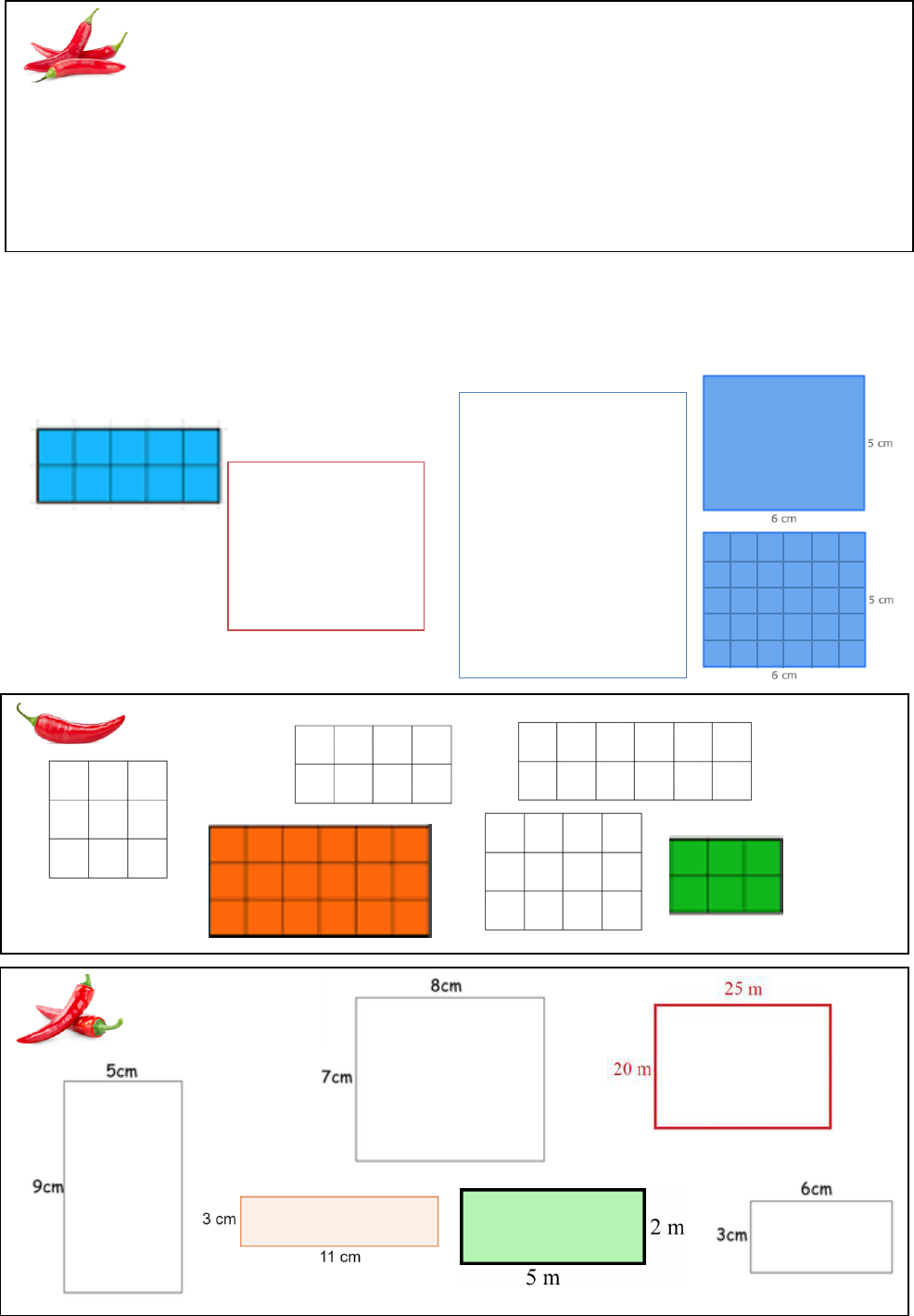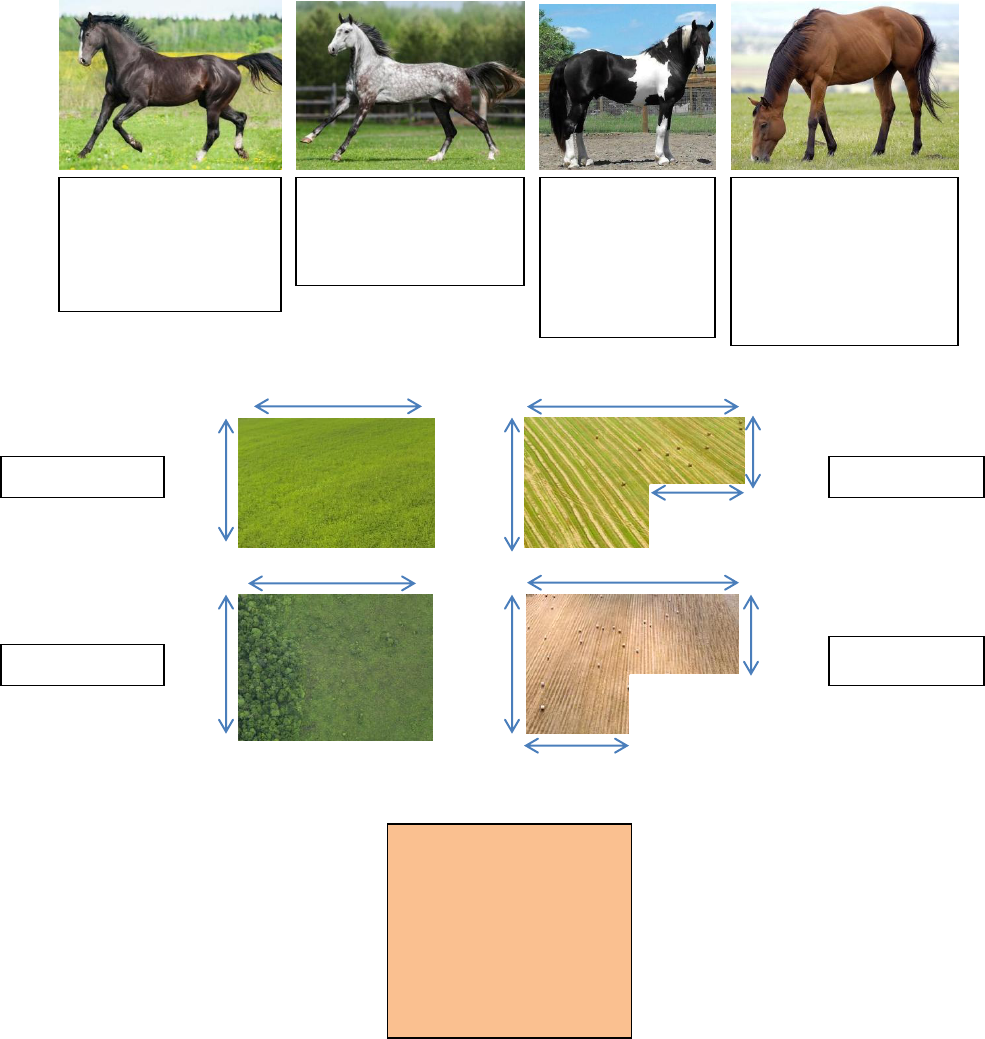
Area and Perimeter
Work through these tasks at your own pace and level:
Answers can be found at the end of the booklet. If your answers don’t match – try the problem again
and see if you can work out how to get to the correct answer.
If you find this part of maths tricky, start here. You can always move up to
something spicier!
Most people will want to start here. Fluency at this stage is really important before
moving up. If you struggle, work on the lower level first, and come back to this.
This is an extension. If you are happy at the level below, try this out and push
yourself to reason with your maths.
Key Vocabulary
Regular – a shape where all sides and angles are the same length
Compound – a shape made of putting other shapes together
Rectilinear – a shape made of horizontal and vertical straight lines
Perimeter – the distance around the outside of a 2D shape
Area – the space covered by a shape

1. Perimeter
Finding the perimeter of a shape means adding all of the sides together:
E.g. 5 + 3 + 5 + 3 = 16cm
Find the perimeter of these regular shapes:
A rectangle has a perimeter of 24m.
How many rectangles can you design that have this perimeter?
How do you know that you found them all?
Find the perimeter:
Make sure to include
the units that the shape
is measured in!
If measurements
are missing – work
them out from the
opposite side –
they’re the same!
5 + 5 + 6 + 6 = 22cm
Find the perimeter:
Multiplication can be
used to speed up finding
the perimeter of regular
shapes. How?

2. Perimeter of Compound Shapes
Add together all of the lines around the shape:
E.g. 4 + 7 + 4 + 3 + 8 + 10 =36cm
However, there is a much quicker solution: By finding the height and width of the shape, adding
these together and doubling the result, you can find the perimeter much faster:
Height: 8cm 8 + 10 = 18cm
Width: 10cm 18 x 2 = 36cm
4cm
4cm
If there are lines
missing, use addition
or subtraction to find
the values:
8 – 4 = 4cm
7 – 3 = 4cm
Find the perimeter:
Find the perimeter:
A
B
C
D
E

3. Area
Area is the amount of space covered by a shape. In a shape split into squares, you can simply count
them:
Area = 10cm
2
Put the perimeters of the shapes above in order, smallest to biggest.
Design 3 compound shapes with a perimeter of 32cm.
Perimeters of rectangles and compound rectilinear shapes are all even. Prove it!
Notice the units are
cm
2
– this is because
we are looking at the
space covered by cm
squared, not straight
lines
If there’s no grid, you
need to multiply the
height of the shape by its
width:
6 x 5 = 30cm
2
Imagine an array across
the shape – by multiplying
the height and width you
find the area.
Find the area:
Find the area:
A
B
C
E
D
F

4. Area of Compound Shapes
Split the shape up into rectangles. Use the height and length of each rectangle to find the area; then
add them together:
E.g. 3 x 4 = 12cm
2
4 x 10 = 40cm
2
12 + 40 = 52cm
2
Put the areas of the shapes above in order, largest to smallest.
The area of a rectangle is 72cm
2
. One of the sides is 6cm long. Draw the rest of the rectangle.
The area of a rectangle is 32m
2
. It is twice as tall as it is wide. Draw the rectangle.
4cm
If there are lines missing, use addition
or subtraction to find the values:
7 – 3 = 4cm
Find the area:
Find the area:

5. Problem Solving
4 farmers want to buy fields to house their horses. There are 4 fields for sale. However, the horses
have certain requirements. Can you match it up so that each farmer gets a field that works for their
horse?
Design a field that would house Farmer A, Farmer B and Farmer D’s horse.
Find the area:
Farmer A’s horse
needs a field with
area of at least
100m
2
Farmer B’s horse
needs a field with a
side at least 12m long
Farmer C’s
horse needs a
field with an
area of less
than 85m
2
Farmer D’s horse
needs a field with
places to hide, so it
must be a compound
shape
Field W
Field X
Field Y
Field Z
11m
10m
15m
6m
6m
9m
8m
4m
7m
3m
13m
8m

Answers:
1.
Find the perimeter of these regular shapes:
A rectangle has a perimeter of 24m.
How many rectangles can you design that have this perimeter?
How do you know that you found them all?
Find the perimeter:
Find the perimeter:
Multiplication can be
used to speed up finding
the perimeter of regular
shapes. How?
16cm
14cm
12cm
12cm
28m
44cm
30cm
90m
28cm
28cm
14m
18cm
54cm
18cm
Multiply the
length of a side
by the number
of sides
9cm
Rectangles with sides:
1m and 11m 4m and 8m
2m and 10m 5m and 7m
3m and 9m 6m and 6m
Doing them in order finds all of the solutions

2.
Put the perimeters of the shapes above in order, smallest to biggest.
Design 3 compound shapes with a perimeter of 32cm.
Perimeters of rectangles and compound rectilinear shapes are all even. Prove it!
Find the perimeter:
Find the perimeter:
A
E
20cm
22cm
32m
28m
290m
110cm
40cm
290m
52m
100cm
C, E, B, D, A
Each side is doubled to
include the opposite
side. So the answer is
always even

3.
Put the areas of the shapes above in order, largest to smallest.
The area of a rectangle is 72cm
2
. One of the sides is 6cm long. Draw the rest of the rectangle.
The area of a rectangle is 32m
2
. It is twice as tall as it is wide. Draw the rectangle.
Find the area:
Find the area:
9cm
2
8cm
2
18cm
2
12cm
2
12cm
2
6cm
2
45cm
2
56cm
2
500m
2
33cm
2
10m
2
18cm
2
E, D, C, A, B, F
6cm by 12cm
8m by 4m

4.
Find the area:
Find the area:
Find the area:
14cm
2
10cm
2
10cm
2
16cm
2
8cm
2
250cm
2
68cm
2
96cm
2
250cm
2
81cm
2
111m
2
96cm
2
12cm
5cm

5.
Farmer A’s horse
needs a field with
area of at least
100m
2
Farmer B’s horse
needs a field with a
side at least 12m long
Farmer C’s
horse needs a
field with an
area of less
than 85m
2
Farmer D’s horse
needs a field with
places to hide, so it
must be a compound
shape
Field W
Field X
Field Y
Field Z
11m
10m
15m
6m
6m
9m
8m
4m
7m
3m
13m
8m
Farmer A – Field W
Farmer B – Field X
Farmer C – Field Y
Farmer D – Field Z
